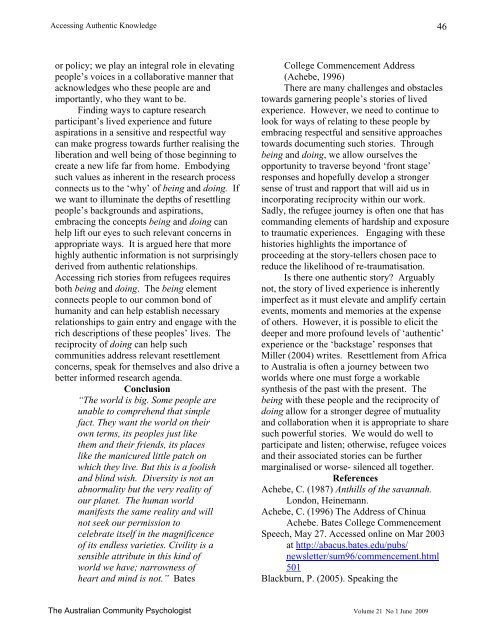issue 1 09 - APS Member Groups - Australian Psychological Society
issue 1 09 - APS Member Groups - Australian Psychological Society
issue 1 09 - APS Member Groups - Australian Psychological Society
Create successful ePaper yourself
Turn your PDF publications into a flip-book with our unique Google optimized e-Paper software.
Accessing Authentic Knowledge46or policy; we play an integral role in elevatingpeople’s voices in a collaborative manner thatacknowledges who these people are andimportantly, who they want to be.Finding ways to capture researchparticipant’s lived experience and futureaspirations in a sensitive and respectful waycan make progress towards further realising theliberation and well being of those beginning tocreate a new life far from home. Embodyingsuch values as inherent in the research processconnects us to the ‘why’ of being and doing. Ifwe want to illuminate the depths of resettlingpeople’s backgrounds and aspirations,embracing the concepts being and doing canhelp lift our eyes to such relevant concerns inappropriate ways. It is argued here that morehighly authentic information is not surprisinglyderived from authentic relationships.Accessing rich stories from refugees requiresboth being and doing. The being elementconnects people to our common bond ofhumanity and can help establish necessaryrelationships to gain entry and engage with therich descriptions of these peoples’ lives. Thereciprocity of doing can help suchcommunities address relevant resettlementconcerns, speak for themselves and also drive abetter informed research agenda.Conclusion“The world is big. Some people areunable to comprehend that simplefact. They want the world on theirown terms, its peoples just likethem and their friends, its placeslike the manicured little patch onwhich they live. But this is a foolishand blind wish. Diversity is not anabnormality but the very reality ofour planet. The human worldmanifests the same reality and willnot seek our permission tocelebrate itself in the magnificenceof its endless varieties. Civility is asensible attribute in this kind ofworld we have; narrowness ofheart and mind is not.” BatesCollege Commencement Address(Achebe, 1996)There are many challenges and obstaclestowards garnering people’s stories of livedexperience. However, we need to continue tolook for ways of relating to these people byembracing respectful and sensitive approachestowards documenting such stories. Throughbeing and doing, we allow ourselves theopportunity to traverse beyond ‘front stage’responses and hopefully develop a strongersense of trust and rapport that will aid us inincorporating reciprocity within our work.Sadly, the refugee journey is often one that hascommanding elements of hardship and exposureto traumatic experiences. Engaging with thesehistories highlights the importance ofproceeding at the story-tellers chosen pace toreduce the likelihood of re-traumatisation.Is there one authentic story? Arguablynot, the story of lived experience is inherentlyimperfect as it must elevate and amplify certainevents, moments and memories at the expenseof others. However, it is possible to elicit thedeeper and more profound levels of ‘authentic’experience or the ‘backstage’ responses thatMiller (2004) writes. Resettlement from Africato Australia is often a journey between twoworlds where one must forge a workablesynthesis of the past with the present. Thebeing with these people and the reciprocity ofdoing allow for a stronger degree of mutualityand collaboration when it is appropriate to sharesuch powerful stories. We would do well toparticipate and listen; otherwise, refugee voicesand their associated stories can be furthermarginalised or worse- silenced all together.ReferencesAchebe, C. (1987) Anthills of the savannah.London, Heinemann.Achebe, C. (1996) The Address of ChinuaAchebe. Bates College CommencementSpeech, May 27. Accessed online on Mar 2003at http://abacus.bates.edu/pubs/newsletter/sum96/commencement.html501Blackburn, P. (2005). Speaking theThe <strong>Australian</strong> Community Psychologist Volume 21 No 1 June 20<strong>09</strong>
















